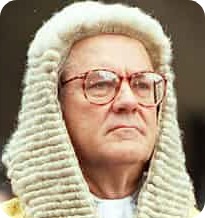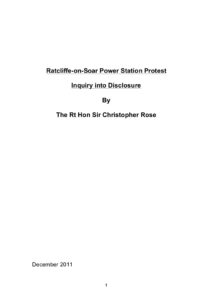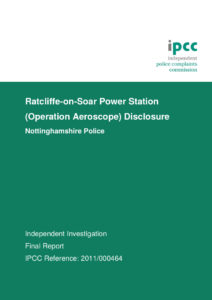
A number of other reports emerged out of the collapse of the Ratcliffe-on-Soar case, widening to take in undercover policing as a whole. Most have not been published. Those relating to Operation Aeroscope are:[1]Rob Evans, How many more inquiries will there be into the undercover infiltration?, The Guardian, 2 November 2011 (accessed 5 July 2017).
Crown Prosecution Services reviews
-
- Review of Clare Montgomery, QC, April 2011, unpublished. Commissioned by the Director of Public Prosecutions, Keir Starmer, to look into the convictions of the first Ratcliffe trial.
- Unpublished internal review, completed 21 March 2011.[2]CPS response to Guardian report on Ratcliffe-on-Soar case, Crown Prosecution Service, 7 June 2011 (accessed 5 July 2017). Christopher Rose’s report also made reference to a review carried out by René Barclay, a Principal Crown Advocate in the CPS’s Special Crime Division. [3]René Barclay is also listed as head of Serious Casework for CPS London. Source: Police and Constabulary Almanac 2011, R Hazell & Co. Otherwise unknown, it is probable this is a reference to the internal review finished on 21 March 2011.
- Review of Chris Enzor. On 23 March 2011, the CPS received a letter (dated 17 March) from Chris Eyre, Deputy Chief Constable of Nottinghamshire Police, stating that the CPS had seen the material relating to the collapse of the second Ratcliffe trial earlier than had been made out in the press at the time. The CPS then commission a second review, under Deputy Chief Crown Prosecutor Chris Enzor in April 2011. In May 2011 the assembled material from this is sent to the IPCC, at which time the Enzor review was ongoing. However, the it appears to have been overtaken by the appointment of Christopher Rose (in July 2011) to investigate and subsumed into that report.[4]CPS response to Guardian report on Ratcliffe-on-Soar case, Crown Prosecution Service, 7 June 2011 (accessed 5 July 2017).
- Rose Report, titled: Ratcliffe-on-Soar Power Station Protest: Inquiry into Disclosure.[5]Sir Christopher Rose, Radcliffe-on-Soar Power Station Protest: Inquiry into Disclosure, Crown Prosecution Service, December 2011. Retired judge, Sir Christopher Rose, was appointed by the CPS to look into failings around disclosure in the Ratcliffe-on-Soar case in July 2011.[6]Rob Evans & Paul Lewis, CPS in crisis as allegations of suppressed evidence wreck trials, The Guardian, 18 July 2011 (accessed 21 July 2017). His report was published in December 2011.
Police reviews
- Serious Organised Crime Agency. This review was ordered in the immediate aftermath of the collapse of the second trial. It focused on the conduct of Mark Kennedy and his superiors. Due to be released alongside the HM Inspectorate of Constabulary 2011 review of undercover tactics, according to Rose it was instead incorporated as Annex A to that report.[7]CPS response to Guardian report on Ratcliffe-on-Soar case, Crown Prosecution Service, 7 June 2011 (accessed 5 July 2017).
- Jack Russell Review. Commissioned by Nottinghamshire Police following allegations that they had concealed evidence from defendants in the Ratcliffe cases. At the time, Russell was Head of the East Midlands Regional Review Unit. The review is unpublished but referenced in the report by Christopher Rose. Parts were leaked to the Guardian in June 2011.[8]Rob Evans & Paul Lewis, Police knew about plans for Ratcliffe-on-Soar break-in before most activists, The Guardian, 7 June 2011 (accessed 5 July 2017).
- Independent Police Complaints Commission, titled: Ratcliffe-on-Soar Power Station (Operation Aeroscope) Disclosure: Final Report. Published March 2012. The lead investigator for the IPCC was Gareth Tobin, and the case supervisor Gemma Jackson.[9]Ratcliffe-on-Soar Power Station (Operation Aeroscope) Disclosure: Final Report, Independent Police Complaints Commission, March 2012.

Notes on the Rose Report
Terms of Reference
Christopher Rose was asked to determine whether the CPS’s approach to charging in the ‘deniers’ case was right given knowledge of an undercover police officer being present, and whether CPS properly complied with disclosure, and followed relevant policy / guidance.[10]Sir Christopher Rose, Radcliffe-on-Soar Power Station Protest: Inquiry into Disclosure, Crown Prosecution Service, December 2011.
People approached & methodology
Rose drew on previous reports such as those by Jack Russell and René Barclay, and a draft of the HMIC Review of Undercover police in relation to public order, and the Serious Organised Crime Agency report. The IPCC also provided him with material gathered during their investigation including statements from several Nottinghamshire Police and NPOIU officers. He had also access to various CPS communications and some of the sensitive undisclosed material at the heart of the matter. Chris Enzor also provided considerable help in obtaining material and liaising with different organisations on behalf of Rose.
It appears that the only people directly spoke to were Bethan David and Ian Cunningham. It is a point of criticism of Rose’s report that he did not question Nick Paul.[11]Ellie Mae O’Hagan, Undercover police aren’t above the law, The Guardian, 13 June 2012 (accessed 21 July 2017).
Conclusions
Christopher Rose wrote:
- 53. Drawing all the strands together, I reach the following specific conclusions:
- (1) The UCO’s authorisations and the transcript of his audio recording, in particular, were never effectively distributed between all relevantly interested police officers or to the CPS, so charging decisions were not made on an informed basis and it was inevitable that proper disclosure could not be made to the defence.
- (2) There could and should have been a meeting, probably by the end of June 2009 and certainly before charging decisions were made in September, between Mr Cunningham, the SIO, the Deputy SIO, the DCI NPOIU, the disclosure officer and the authorising officer at which the sensitive material, particularly the UCO’s authorisations and the content of his audio recording could have been made clearly known to all present and their significance discussed.
- (3) If there had been such a meeting it is highly unlikely that anyone would have thought it in the public interest for charges to be brought, bearing in mind the DCI NPOIU’s determination that the UCO should not give evidence and his identity should be protected and the likelihood that a [public interest immunity (PII)] application to a judge to protect the UCO’s identity and involvement would fail.
- (4) Proper disclosure was not made to the defence and no PII application to a judge was made or considered because of failures, over many months and at more than one level, by the police and the CPS.
- (5) The failures were individual, not systemic and not due to any want of printed guidance. All involved were well aware, or should have been if relevant guidance had been consulted, of what they needed to do to comply with the CPIA obligation.
- (6) There was no significant failure by prosecuting counsel.
- 54. It follows that the answers to the questions posed by my terms of reference can be summarised as follows:
- (a) The CPS approach to charging was not right because, knowing of the existence of a UCO, they did not see, or ask to see, as they should have done, all the relevant sensitive material.
- (b) There was no failure by prosecuting counsel to comply with their disclosure duties in view of their instructions from the CPS, but the CPS failed properly to comply with their disclosure duties partly because they failed to ask questions of the police, partly because the police failed to tell the prosecutor the extent of the UCO’s participating authorisations and partly because the Case Management Review Panels’ oversight of the prosecutor was not as effective as it could or should have been.
- (c) The CPS arrangements for handling the known existence of a UCO were adequate but not properly followed.
- (d) Relevant guidance and policy in relation to the known UCO were not followed.

Notes on the IPCC report
The lead investigator for the IPCC was Gareth Tobin, working under Case Supervisor Gemma Jackson.[12]Ratcliffe-on-Soar Power Station (Operation Aeroscope) Disclosure: Final Report, Independent Police Complaints Commission, March 2012.
Terms of Reference
The terms of reference only applied to failures within Nottinghamshire Police as to whether there had been a failure to properly disclose material, and if so did this amount to misconduct, criminal offence or a breach of professional behaviour, and what organisational learning their might be.
There was no detailed examination of the role of the NPOIU in matters.
Officers approached & investigated
The report says that the actions of Nottinghamshire police officers and staff Ackerley, Pearson, Roberts, Malik, Matharu and Zajac were investigated. All gave written witness statements; none were served with a notice of investigation. James had retired from Nottinghamshire Police by that point, but did provide a report, based on memory only. The NPOIU DCI also provided ‘a report on his involvement with the UCO and the product provided’. As he had subsequently retired, his name was left unpublished.
It is to be noted that the Russell Review for the Regional Review Unit noted that Jack Russell had interviewed seven officers, (1 x ACC, 2 x Det. Supt., 2 x Det. Insp., 1 x Disclosure Officer, 1 x Intelligence Officer).[13]Steven Morris, Response to FOIA request of Steve Jones regarding review of the East Midlands Regional Review Unit, Leicestershire Police, 19 August 2013. Archived via SpecialBranchFiles.uk.
Five of these can be provisionally identified as Ackerley, Pearson, Roberts, Malik and Zajac, and these interviews are likely to have formed part of the material considered by the IPCC.
Conclusions
The report focuses to some degree whether Ian Cunningham was adequately briefed and accepts that he was. It points out minor failures in process within Nottinghamshire police and did not find any case for misconduct. Much of this is based on whether the Aeroscope officers fully understood the implication of Kennedy having a recording device. Given there was a transcript made available and what was released, and the stated intention of protecting the source by both Ackerley and the NPOIU DCI, the conclusions read as deficient and fail to ask pertinent questions on the flow of strategy and information. Particularly as read in context with the contents of the disclosed transcript there is little of actual substance in the latter. Notably missing being Kennedy’s role in promoting and encouraging the action, particularly in arguing for it to go ahead after police vehicles were spotted at the power station.
The conclusions also effectively ignore the role of the NPOIU, though at paras.110 & 111 (in the report’s own conclusion) it is noted:
- 110. The dissemination of the sensitive material from the NPOIU through to the police is best described as ad hoc. The officers from the NPOIU should be considered experts in their field of work, which includes UCOs and the material they produce. The transcript should have been fully explained to Nottinghamshire Police with regard to its evidential value, whether it went beyond the UCO use and conduct, or if there were any issues around the UCO potentially having acted as an agent provocateur. There is no evidence that this conversation took place.
- 111. The Disclosure Manual explains that in cases involving highly sensitive and CHIS material, the person holding the material, in this case the NPOIU, should prepare a highly sensitive schedule and make contact with the prosecutor. The material must be viewed by a unit head, special case lawyer or a delegated prosecutor. This did not occur in this case.
References
| ↑1 | Rob Evans, How many more inquiries will there be into the undercover infiltration?, The Guardian, 2 November 2011 (accessed 5 July 2017). |
|---|---|
| ↑2, ↑4, ↑7 | CPS response to Guardian report on Ratcliffe-on-Soar case, Crown Prosecution Service, 7 June 2011 (accessed 5 July 2017). |
| ↑3 | René Barclay is also listed as head of Serious Casework for CPS London. Source: Police and Constabulary Almanac 2011, R Hazell & Co. |
| ↑5, ↑10 | Sir Christopher Rose, Radcliffe-on-Soar Power Station Protest: Inquiry into Disclosure, Crown Prosecution Service, December 2011. |
| ↑6 | Rob Evans & Paul Lewis, CPS in crisis as allegations of suppressed evidence wreck trials, The Guardian, 18 July 2011 (accessed 21 July 2017). |
| ↑8 | Rob Evans & Paul Lewis, Police knew about plans for Ratcliffe-on-Soar break-in before most activists, The Guardian, 7 June 2011 (accessed 5 July 2017). |
| ↑9, ↑12 | Ratcliffe-on-Soar Power Station (Operation Aeroscope) Disclosure: Final Report, Independent Police Complaints Commission, March 2012. |
| ↑11 | Ellie Mae O’Hagan, Undercover police aren’t above the law, The Guardian, 13 June 2012 (accessed 21 July 2017). |
| ↑13 | Steven Morris, Response to FOIA request of Steve Jones regarding review of the East Midlands Regional Review Unit, Leicestershire Police, 19 August 2013. Archived via SpecialBranchFiles.uk. |